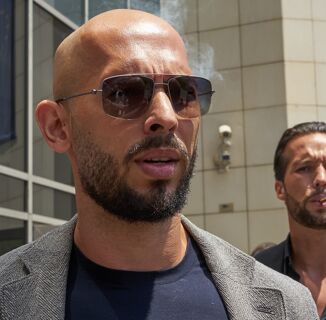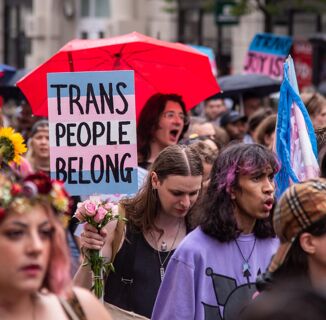*Photo credit: Ricardo Morán via Instagram
Ricardo Morán has played many parts over the years on his way to becoming a household name in Peru: television producer, presenter, theater director, artist, and author. But now, he is perhaps playing his most challenging role yet: that of being a gay father in one of South America’s most conservative countries.
“I have never had a moment in my life when I didn’t wish to be a parent,” said Morán for INTO in a video call from the Peruvian capital, Lima.
“I have this vivid memory of my father teaching me how to ride a bike…but when I finally accepted that I was gay, I wasn’t sure how I would be able to dream of teaching my own child to ride a bike.”
In Peru, there is no law for gestational surrogacy, regardless of the couple’s sexual orientation. The only law in Peru that exists regarding non-traditional pregnancies is Article 7 of the General Health Law (la Ley General de Salud – Ley N° 16842). This law says that everyone has the right to infertility treatment but only deals with artificial insemination. Article 7 also says that the egg used for the pregnancy must belong to the birth mother. But in gestational surrogacy, the birth mother and egg donor are different people. Therefore, in Peru, where same-sex adoption is illegal, gay couples may find themselves compelled to discreetly explore surrogacy as one pathway to parenthood.
“As is often the case for unregulated processes, there are no protections for both the intended parents and the surrogate, so abuse could happen and does happen,” said Morán. “It’s a black market.”
So Morán, 49, decided to pursue a different (more expensive) pathway to fatherhood.
In order to father his twins, Emiliano and Catalina, Morán traveled to the United States. After their birth, though, the new father’s joy was swiftly tempered by the realization that he now had a battle on his hands. Peru would not recognize his children as citizens.
When Morán took his children to the Peruvian Consulate in Houston, Texas, he thought it would be a routine process of registering them as Peruvian citizens born abroad. He soon discovered that he would be in for a long fight.
“My sister was with Catalina, and I was holding Emiliano,” said Morán. “[The consul] had this photocopied paper and he said, ‘Where is the part where it says a man can register a kid alone?'”
Peru’s national registry, RENIEC, requires a mother to be present in order to register a newborn as a Peruvian citizen.
“Paradoxically, trying to have my kids through a regulated and legal process in a different country, I ended up with my newly formed family in another unregulated situation: the impossibility…to register my children as Peruvians,” said Morán. “They are foreigners in their father’s country,”
RENIEC’s regulations were written in 1936 and revised in 1984, when assisted reproductive techniques were not popular. So a gap exists in Peru’s legislation for people of any gender and sexual orientation who have children through gestational surrogacy. However, if a heterosexual couple had their children through gestational surrogacy in Texas, like Morán did, their names would be listed as the mother and father on the U.S. birth certificate and they would be able to register them with a Peruvian consulate. A child born to a single father or two gay men through surrogacy would not have a mother’s name listed on the birth certificate.
What we’re actually fighting for is the rights of Emiliano and Catalina. Peruvian law states that a child born to a Peruvian anywhere in the world is entitled to Peruvian citizenship…This is what’s not being fulfilled in the case of Emiliano and Catalina.
Ricardo Morán
After failing to obtain passports for his children, the producer returned to Lima with the twins – on tourist visas thanks to their American passports. However, this meant the children were only allowed to stay in the country for six months at a time.
After four years of leaving Peru every six months to renew their visas, Morán decided this was just not sustainable. His twins are therefore currently overstaying their tourist visas, though Morán admits this “doesn’t look good” for his case. And now, Morán’s options are close to being exhausted.
After losing multiple appeals with RENIEC, Morán’s case is currently before a constitutional tribunal. If the tribunal does not decide in his favor, the only recourse is the Inter-American Court of Human Rights, which could take up to a decade to rule and whose ruling Peru may not even enforce.
“What we’re actually fighting for is the rights of Emiliano and Catalina,” said Morán. “Peruvian law states that a child born to a Peruvian anywhere in the world is entitled to Peruvian citizenship…This is what’s not being fulfilled in the case of Emiliano and Catalina.”
RENIEC did not respond to a request for comment.
At least 75% of Peru’s population are Roman Catholic or belong to another branch of Christianity. Perhaps as a result, only 28% of Peruvians said they were in favor of granting same-sex couples the right to adopt, according to a 2022 Ipsos survey. A further 2023 survey from Ipsos revealed that 98% of LGBTQ people surveyed were either “extremely” or “very” dissatisfied with “the role of the State in guaranteeing rights of diverse families/LGBTIQA+ people.” 71% of Peruvians believe that LGBT people are either “discriminated against” or “very discriminated against.”
According to LGBTQ family campaigners Familias Homoparentales Peru (FHP) and Ipsos, the majority of same-sex families in Peru are households with two women. Lesbian couples, however, experience different issues than Morán’s, their research found. For example, a couple comprising two women is able to register their children under the name of the birth mother. However, as Karenina Alvarez Johnson, president of FHP, explained, having only one parent registered with the child can create another set of difficulties.
“When I separated from my ex-wife, I also stopped being the mother to my daughter under Peruvian law,” said Johnson. “There exists no document which supports my maternal rights.”
There exists no law in Peru’s constitution for civil unions for same-sex couples, which would allow some element of parental rights. Attempts in previous years to pass bills in favor of the move have serially failed in parliament. Both Johnson and Morán expressed doubts that change would come from Peru’s Congress any time soon.
“I haven’t really engaged [with Peru’s government] in my fight to register my kids because I don’t believe in the power of this Congress to do anything that is not in their own self-interests,” said Morán.
Yet despite the legal hurdles, he remains optimistic.
“What I want for Peru is that whether a child is born in Lima or in a small remote town, that he is cared for and nourished, and that he has opportunities through education and the respect of his family,” said Morán.
“I wish this for my kids and the same for kids all over Peru. I just wish for them to be happy.”
Related:
Peruvian TV Producer Ricardo Morán and His Fight to Register His Children
“I have never had a moment in my life when I didn’t wish to be a parent.”
Help make sure LGBTQ+ stories are being told...
We can't rely on mainstream media to tell our stories. That's why we don't lock our articles behind a paywall. Will you support our mission with a contribution today?
Cancel anytime · Proudly LGBTQ+ owned and operated
Read More in Impact
The Latest on INTO
Subscribe to get a twice-weekly dose of queer news, updates, and insights from the INTO team.
in Your Inbox














